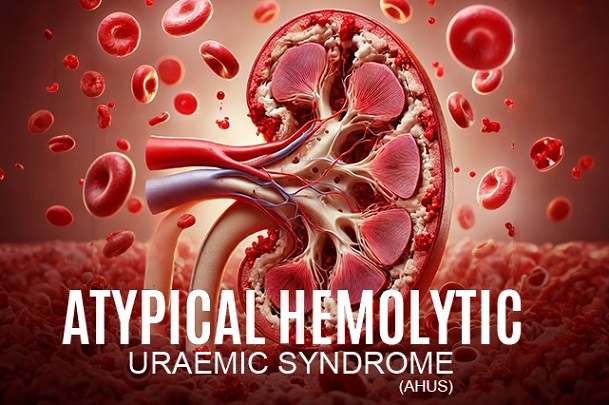Case Study Highlights That COVID-19 Can Cause Atypical Hemolytic Uremic Syndrome in Those with Genetic Predispositions
Nikhil Prasad Fact checked by:Thailand Medical News Team Jan 24, 2025 3 months, 2 days, 1 hour, 32 minutes ago
Medical News: Introduction to a Rare Case of aHUS Triggered by COVID-19
In a groundbreaking medical case, researchers from Gifu University’s Department of Pediatrics and Advanced Critical Care Center, along with Gifu University Hospital in Japan, have shed light on a rare but alarming connection between COVID-19 and atypical hemolytic uremic syndrome (aHUS). This rare disorder is characterized by a triad of symptoms: microangiopathic hemolytic anemia, thrombocytopenia, and acute kidney injury. It stems from an overactive alternative complement pathway, often due to genetic predispositions. This
Medical News report explores the case of a 13-year-old boy whose mild COVID-19 infection led to the onset of this severe condition, providing crucial insights into its pathophysiology and implications for medical practice.
 Case Study Highlights That COVID-19 Can Cause Atypical Hemolytic Uremic Syndrome in Those with Genetic Predispositions
The Case of a Young Patient and His Struggle with aHUS
Case Study Highlights That COVID-19 Can Cause Atypical Hemolytic Uremic Syndrome in Those with Genetic Predispositions
The Case of a Young Patient and His Struggle with aHUS
The case involved a 13-year-old Japanese boy with no significant medical history. Following a mild COVID-19 infection presenting as a sore throat, headache, and diarrhea, the boy developed alarming symptoms, including thrombocytopenia and hematuria. Upon further investigation at Gifu University Hospital, tests revealed a significant decline in platelet count, microangiopathic hemolytic anemia, and elevated creatinine levels. These findings suggested thrombotic microangiopathy (TMA), a hallmark of aHUS.
Genetic analysis later confirmed that the boy carried a pathogenic gain-of-function (GOF) variant in the complement component 3 (C3) gene, specifically the p.Ile1157Thr mutation. This mutation is relatively rare globally but more common in the Japanese population. It predisposes individuals to excessive complement activation, especially when triggered by infections like COVID-19. Interestingly, the boy’s father also carried the same genetic variant and had a history of unexplained TMA following influenza infection, further highlighting the hereditary nature of this condition.
Unraveling the Link Between COVID-19 and aHUS
The case report aligns with an increasing body of evidence suggesting that COVID-19 can act as a trigger for aHUS, even in patients with mild respiratory symptoms. According to the researchers, the spike protein of SARS-CoV-2 can activate the complement lectin pathway by interacting with mannose-binding lectin (MBL). This activation cascades into the alternative complement pathway, particularly in genetically predisposed individuals. The SARS-CoV-2 spike protein further disrupts the regulatory function of complement factor H (CFH), a crucial protein that controls complement activation. This disruption leads to excessive activation of the alternative complement pathway, resulting in TMA and the clinical manifestation of aHUS.
Treatment and Recovery
Upon admission, the boy’s condition rapidly deteriorated, with worsening anemia, thrombocytopenia, and rising creatinin
e levels. Clinicians initiated plasma exchange therapy, a treatment that removes abnormal complement system proteins and replenishes normal ones. This therapy proved successful in stabilizing the patient’s condition, allowing him to avoid the use of anti-C5 antibody therapies such as eculizumab. After five sessions of plasma exchange, his symptoms began to resolve, and he was discharged after 18 days in the hospital. A year later, he remained relapse-free, even after contracting influenza A, demonstrating the effectiveness of early intervention.
Broader Implications and Research Findings
This case underscores the unique ability of SARS-CoV-2 to activate the complement system and trigger severe immune responses in genetically predisposed individuals. Researchers from Gifu University emphasized that patients with inborn complement system abnormalities, such as C3 GOF variants, are at higher risk of developing severe conditions like aHUS following infections. Notably, the literature has documented over 20 cases of de novo or relapsed aHUS linked to COVID-19, with similar findings of complement pathway activation.
Plasma exchange and anti-C5 therapies remain the primary treatment options for aHUS. However, the study highlights the need for early diagnosis and genetic screening in patients with a family history of thrombotic microangiopathy. Identifying genetic predispositions can help clinicians tailor treatment plans and improve outcomes.
Conclusion
This case reinforces the critical need for vigilance among healthcare providers when treating children with COVID-19, especially those with a family history of complement-mediated diseases. Genetic predispositions, such as the C3 p.Ile1157Thr variant, can significantly increase the risk of severe complications, even in cases of mild viral infections. Early recognition and intervention can dramatically improve outcomes, as demonstrated in this young patient’s case. As researchers continue to uncover the mechanisms behind COVID-19’s impact on the immune system, this report serves as a vital reminder of the interplay between genetics and infectious diseases.
The study findings were published in the peer-reviewed journal: Frontiers in Pediatrics.
https://www.frontiersin.org/journals/pediatrics/articles/10.3389/fped.2025.1507727/full
For the latest COVID-19 News, keep on logging to Thailand
Medical News.
Read Also:
https://www.thailandmedical.news/news/covid-19-causes-reversible-cerebral-vasoconstriction-syndrome-that-lasts-for-months
https://www.thailandmedical.news/news/25-percent-of-all-exposed-to-covid-19-will-develop-dysphonia-and-70-percent-of-them-will-have-persistent-voice-issues
https://www.thailandmedical.news/news/researchers-from-china-explore-the-connection-between-prostatic-diseases-and-covid-19
https://www.thailandmedical.news/news/french-study-uncovers-impact-of-covid-19-on-thyroid-function-tests-and-the-prevalence-of-euthyroid-sick-syndrome
https://www.thailandmedical.news/news/covid-19-induces-expression-of-anti-agtr1-autoantibodies-causing-endothelial-dysfunction-and-symptoms-treatable-by-losartan
https://www.thailandmedical.news/articles/coronavirus
